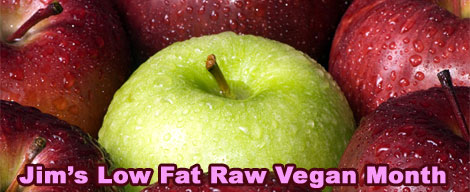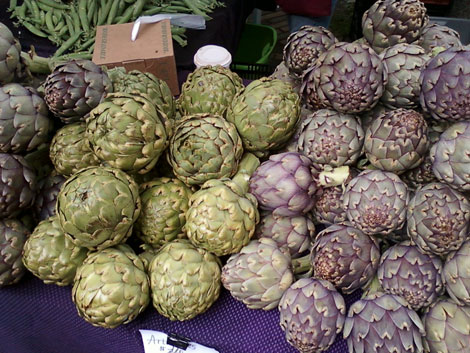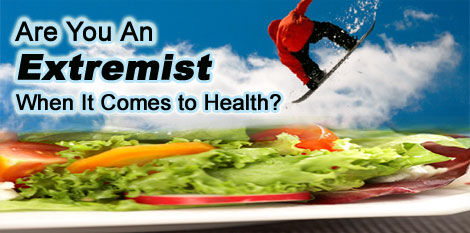
Here it is...the Queen of all Juices! It's cooling, cleansing, light, easy, delicious, pretty, promotes weight loss, energizing, vibrant, and FUN!
Can one simple juice really be so wonderful for your body? Yes!! Following is the recipe, as well as some highlights about the ingredients and why it's so great for your body.
Cooling and Cleansing Juice
(Serves 1)4 medium apples

Just a few brief thoughts for you this Weird Wednesday...
Of all the species on this Earth, it's weird that no other animals besides people cook their food. Similarly, of all the species on this Earth, it's weird that no other animals besides people drink the milk of other animals.

Jim here... Exactly one month ago today, I announced my intention to do a month-long trial of a low-fat raw vegan protocol largely based on the well-known 80-10-10 diet. I posted a half-way point update on May 15th, and now here we are at June 1st already. So, are you ready for the thrilling conclusion
As I've stated before, I went into this experiment rather hard-core, with one full week of zero overt fats, and then gradually introducing a few richer ingredients (although keeping within the 10% fat ceiling). I found much of the past month to be an exercise in restraint and self-control, similar to the issue many people face when going raw while the rest of the family is still eating cooked foods.However, it got significantly easier as time passed.
Read more: Jim's Low-Fat Raw Vegan Month Concludes. Now What?!

And you thought Apple Cider Vinegar was tough to pin down ? Ever come across the whole fluoride controversy
A Google search on "fluoride" returns 6,300,000 results.A Google search on "fluoride toothpaste" returns 246,000 results.

An online friend of mine, Kevin Gianni (see previous blog entry introducing him), has been producing a terrific series of videos and blog posts. At the end of each post, he asks questions of his readers. In his recent post, he asked his readers:
What struggles have you been through

Here's a picture I took at Portland's Saturday Market last week. We've been pleasantly surprised to find that artichokes grow rather well here in the Pacific Northwest. We don't recall seeing them much back East, but many of our neighbors grow them (both for the artichokes and, I suspect, as ornamental plants).
I suspect that some raw foodists tend to overlook artichokes because they're so traditionally linked with the image of something steamed, stuffed with breadcrumbs, and drizzled in butter -- so, "cooked," "breaded," and "dairy" all together in one recipe! Being half Italian, I grew up eating them this way. My mother almost never said "artichoke"; she always called them an Italian word that sounded like "ga-GO-che-lee." ?She made them just a few times per year, and they were always a huge treat (and we'd often fight over the hearts -- by far the best part!).

Jim here... When you consider the agricultural and marketplace practices that affect the food we eat (e.g., pesticide use in the fields, widespread irradiation afterward, and the contamination of produce from various sources -- not to mention some of the disturbing potentialities we face in terms of further governmental intervention into the food chain), it leads one to the conclusion that, if we really want to eat the best food ever, growing it yourself is a great solution. It's also cheaper to grow your own and, in my opinion, more fulfilling than purchasing it (if you have the time and space to manage it, that is).
With all of these concerns (and more) in mind, we've launched a new series of interviews called "Know the Growers" in which I'll be interviewing organic farmers around the world on best practices in the field. Initially, we'll be publishing them every few weeks, most likely. Once we sell our home and are "full-time Pure Jeevan karma yogis," we'll be publishing them weekly (along with resuming our daily video series Know Your Food). I'll be publishing these organic farming interview transcripts on NaturalNews.com under their Citizen Journalist program.
Read more: Pure Jeevan Launches Natural News Interview Series Focusing on Organic Farming

Wendi tells a funny story sometimes about a woman she'd met who was considering undergoing gastric bypass surgery to help her lose weight. When Wendi asked the woman whether she'd consider changing her diet to a raw foods regimen, she responded with something like, "Oh, no, that's too radical."
This is really what it's come to in society; having part of your digestive system surgically altered (in a profound, irreversible, dangerous, and invasive way) is no more than some nonchalant, consequence-free elective decision ... while eating more salads is viewed as "radical."

I thought I'd put another fun week together here at Pure Jeevan while Wendi is away (although, actually, ALL of our weeks are fun-filled here!). This week, I thought I'd discuss herbs, spices, and essential oils. Of course, I can't cover those enormously important (and huge) subjects in-depth over the course of just one week, so I created that little banner (above) so that we can re-use it from time to time.
Herbs are fascinating, aren't they? Sometimes, you don't even consciously know why you use the ones you do but, invariably, there's a reason. Sure, sometimes recipes call for a specific flavor. But, often, there are other reasons as well -- such as to support digestion, or to provide a warming or cooling sensaiton. This type of thing is critical in ayurvedic principles, as we touched on recently on this blog, where the spices could be present for digestive or medicinal purposes, or of course as a preservative.

Yesterday, we covered the concept of "unsubscribing" from unhealthy practices. This was of course based on the common Internet practice of subscribing and unsubscribing to various things like newsletters and email lists. I receive quite a few of these each day, many raw foods ones and many non-raw ones. Among the non-raw, one that has been interesting to me lately is called the Art of Non-Conformity, penned by Chris Guillebeau. Basically, Chris' site chronicles his adventures in reaching his personal goal -- to travel to every country in the world! Along the way, he writes about all sorts of out-of-the-box things, as the blog name implies.
Today, he posted something that is remarkably insightful and applicable to our subject matter here, even though his context was completely different. The entry, entitled simply "Before and After," discusses the drinking water problems in much of Africa, focusing for the moment on Liberia. Atop the piece (the "before" picture) is a muddy water hole, the only source of drinking water for one village. The next picture (the "after" shot) shows a different, very happy village obtaining fresh, clean water from a newly installed well. Chris closes his article with the following quote:
Before we moved to Portland, Oregon, land of all things fresh and organic within walking distance, we had to drive quite a distance to reach the food co-op (the only place that had a good selection of organic produce and other raw food necessities). So, we only went shopping about once a week. It took a lot of trial and error to find ways to keep our weekly produce fresh for about a week.
We learned which fruits and vegetables stay fresh the longest, and which go bad the fastest. Based on this, we stocked the refrigerator accordingly (and used up the produce accordingly, as well). The fruits and veggies that stayed fresh the longest were stored in the backs of the shelves (things like carrots, beets, broccoli, cauliflower, apples, etc.). Next we stored the greens that lasted a pretty good amount of time (like kale and collards). And in the front of the shelves and in the door, we stored the more delicate greens (like lettuces and herbs).

